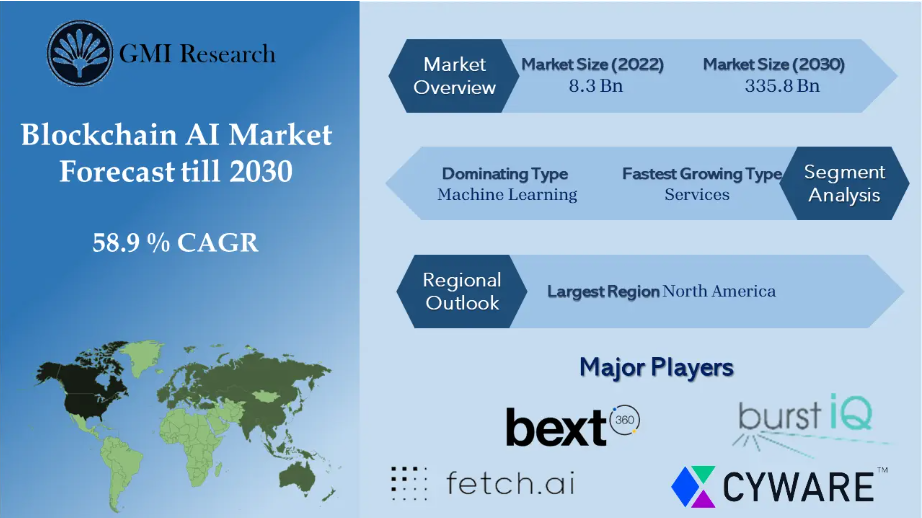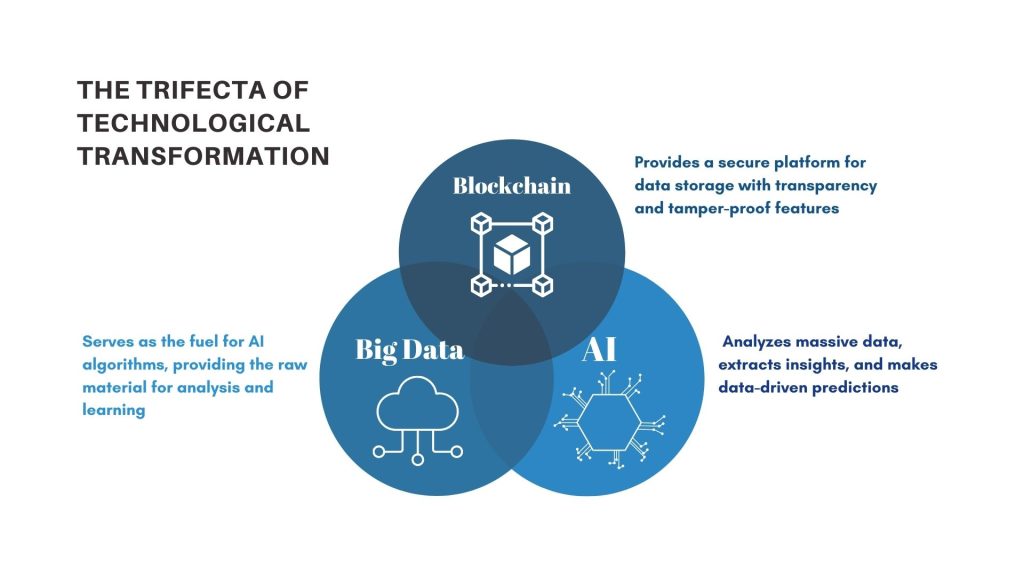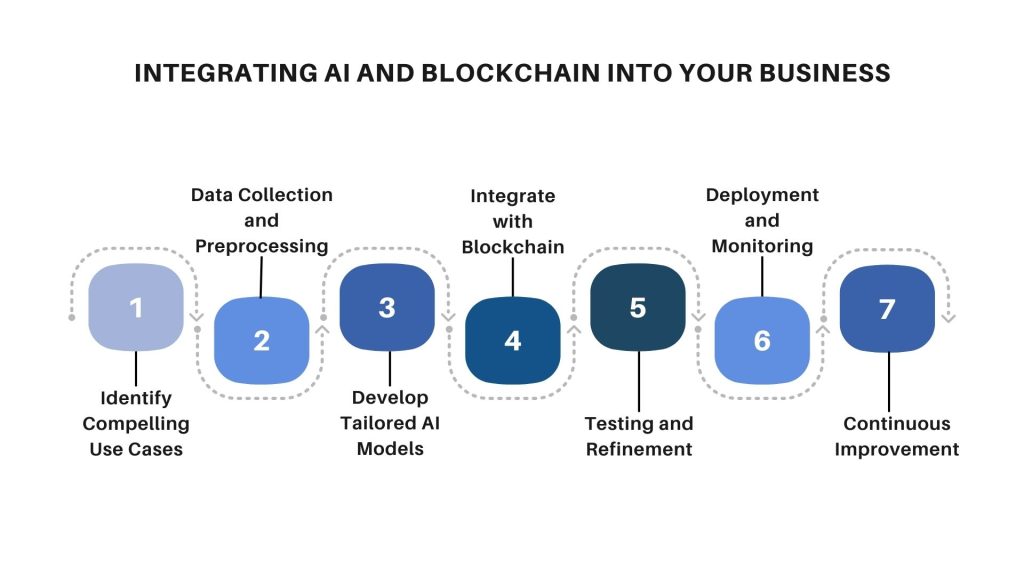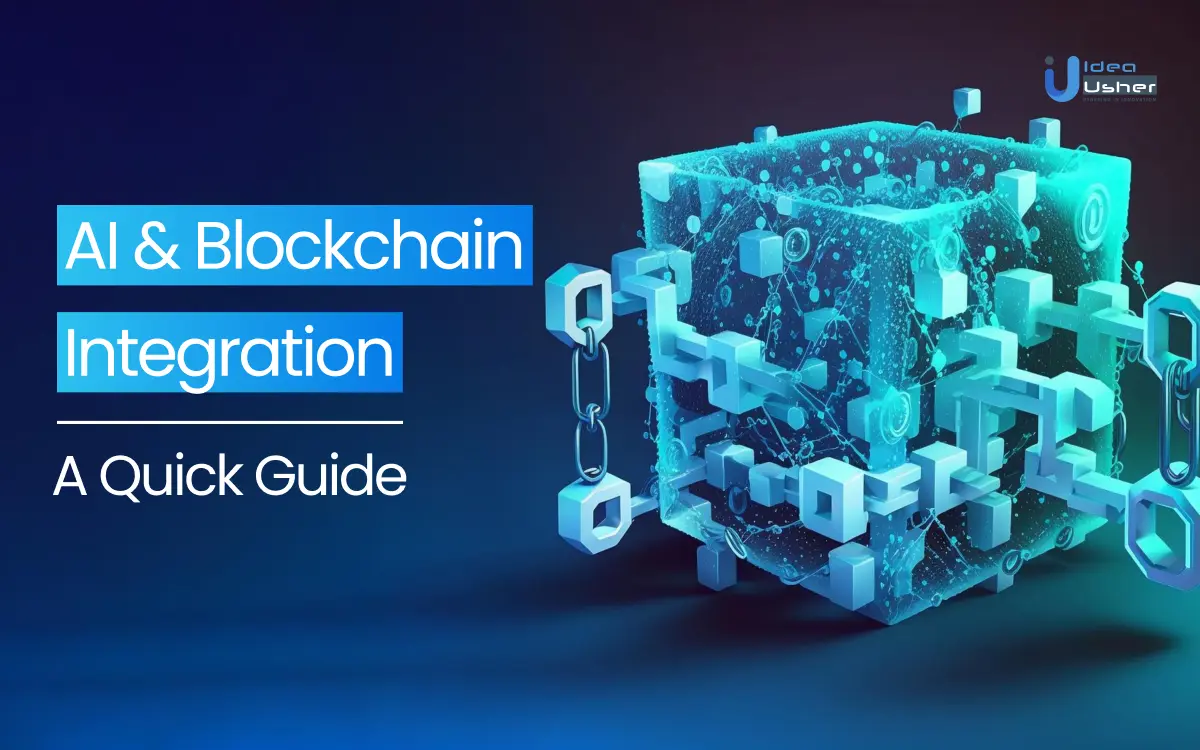Artificial intelligence and Blockchain have surfaced as progressive forces within the digital ecosystem. Individually, they have demonstrably impacted various industries and reshaped societal interactions. However, their convergence signifies a paradigm shift, ushering in a new era brimming with possibilities.
This synergistic fusion of AI and Blockchain has the potential to revolutionize sectors like supply chain logistics, healthcare, and cybersecurity, ultimately leading to unparalleled advancements.
In this blog, we will discuss the collaboration of AI and Blockchain, exploring its burgeoning role and the transformative future it promises. We will also showcase how their combined power enhances security, transparency, and efficiency across a broad spectrum of industries.
Key Market Takeaway of AI in Blockchain
According to a report by GMI Research, the Blockchain AI market has experienced significant growth, reaching a value of USD 8.3 billion in the year 2022. Looking ahead, the market is forecasted to reach a staggering USD 335.8 billion by 2030, reflecting a compound annual growth rate of 58.9% between 2023 and 2030. This impressive growth trajectory underscores the increasing convergence and potential of AI and blockchain technologies.

Driving Forces of AI in Blockchain Technology
- Tech Innovation: Constant advancements in materials, manufacturing, and digital technologies are continuously improving Blockchain AI products and services.
- Rising Demand: Population growth, urbanization, and evolving consumer preferences demanding secure and transparent solutions are fueling market expansion.
- Supportive Regulations: Favorable government policies and incentives are acting as a springboard for market growth.
- Going Green: Eco-friendly Blockchain AI solutions are gaining traction due to rising environmental awareness.
- Cost Reduction: Economies of scale, technological advancements, and increased competition are making these solutions more affordable.
The Interplay of AI, Big Data, and Blockchain
Big data is vital for the development of AI and Blockchain. It enables businesses to accumulate vast amounts of raw data and organize it into a structured format.
AI-powered machines and applications leverage this data to gain deep insights into user behavior. These insights are then employed to customize the user experience, improving customer satisfaction and loyalty.
Blockchain, on the other hand, relies on extensive data analysis to populate its distributed ledger. This secure and tamper-proof ledger stores data that can be fetched by authorized users depending on the network type (public or private).

AI Empowered by Big Data, Secured by Blockchain
Big Data fuels AI’s learning and development, while Blockchain ensures the security and integrity of this data, strengthening the foundation for reliable AI models.
Blockchain Secured by AI
AI algorithms can analyze blockchain activity in real time, identifying and preventing potential security threats and creating a robust and secure environment for data storage and transactions.
Big Data Made Meaningful with AI
Big Data, on its own, can be overwhelming. AI acts as the interpreter, extracting valuable insights and patterns, allowing for better data-driven decision-making.
AI, fueled by Big Data and secured by Blockchain, can unlock a new era of intelligent decision-making. Industries like supply chain management can benefit from real-time tracking powered by AI and secured by Blockchain, leading to improved efficiency and reduced costs. In healthcare, AI can analyze medical data for personalized diagnoses and treatment plans, while Blockchain offers a secure platform for organizing and managing sensitive patient information. This synergy has the potential to streamline processes, improve transparency, and ultimately transform how we live and work.
Understanding AI’s Impact on Blockchain Technology
While Blockchain has established itself as an innovative technology, it still faces certain limitations. Here’s how Artificial Intelligence can potentially bridge these gaps and push Blockchain towards its full evolutionary potential:
Intelligent Data Management
AI streamlines data mining within blockchain networks, enabling faster and more targeted information retrieval. This reduces processing time and operational costs associated with traditional data analysis methods.
Optimized Energy Consumption
AI’s ability to streamline data mining processes translates to a more energy-efficient blockchain ecosystem. By minimizing redundant computations, AI reduces the overall energy footprint of blockchain operations.
Enhanced Scalability
AI addresses blockchain scalability challenges through the introduction of advanced decentralized learning systems and innovative data-sharing techniques. It fosters a more scalable blockchain environment that benefits both established enterprises and emerging startups.
Boosted Transaction Efficiency
Transaction costs within peer-to-peer (P2P) blockchain systems can be significant. AI can address this by identifying the optimal node to execute a transaction, eliminating redundant efforts by other nodes. This translates to faster transaction processing and reduced overall costs.
Fortified Security Through AI
While Blockchain boasts robust security features, integrating AI adds another layer of protection. AI’s capabilities in natural language processing, image recognition, and real-time data transformation can significantly enhance security within blockchain networks. This empowers businesses to conduct secure data transactions with greater confidence.
AI-Powered Data Governance
With the potential for all data to reside on blockchains in the future, organizations will need efficient ways to manage data access and usage. AI acts as the perfect data gatekeeper, ensuring a streamlined flow of information within the blockchain ecosystem. AI can track data usage, manage access controls, and oversee related tasks, streamlining data governance for businesses.
Leveraging Blockchain Technology to Evolve AI Ecosystems
Artificial intelligence is taking industries by storm, but its next steps rely on a steady stream of trustworthy, high-quality data. Here’s where Blockchain steps in. By presenting a secure and transparent platform, Blockchain has the potential to be the missing piece that unlocks AI’s full potential in a decentralized environment. Let’s take a look at some of the factors that can help enhance AI ecosystems further.
Trusted Transactions
Blockchain provides a secure and straightforward platform for storing and sharing data. This data is tamper-proof and accessible to everyone on the network, ensuring its authenticity and accuracy and eliminating the issue of unreliable data sources that can plague AI systems.
High-Quality Data
Traditionally, AI is limited by the data it can access. Blockchain provides a vast pool of data that’s not controlled by any single entity. This data is also tamper-proof and readily available to everyone on the network. Additionally, smart contracts can securely enforce rules around data usage and analysis, ensuring compliance while maintaining data privacy.
Democratizing AI
Currently, data centralization creates limitations for AI systems, hindering their ability to make accurate decisions. Blockchain allows for frictionless information sharing and verification among all participants within a network. This verified and diverse data empowers AI systems to reveal hidden patterns and insights that were previously missed. Deep learning algorithms can then leverage these insights to make more accurate predictions and better decisions.
Lowering Market Entry Barriers
Many AI-powered applications face hurdles entering the market due to concerns about data ownership, accuracy, and the involvement of intermediaries. By merging AI with Blockchain, these barriers can be dismantled. Blockchain eliminates single ownership, removes intermediaries, and ensures data security and authenticity, paving the way for faster and more profitable market entry for AI solutions.
Transparency by Design
Blockchain fosters transparency in AI systems. All the decision-making processes within an AI program are recorded on the Blockchain, accessible to everyone in real time. This allows businesses to pinpoint the cause of any errors or issues within the AI system, enabling them to develop better strategies for the future.
Building Trust in AI
While AI is making a significant impact, trust remains a primary concern. Blockchain offers a solution by creating a publicly accessible and tamper-proof registry that stores data and related AI models using secure digital signatures. Everyone can access real-time information that’s been verified by smart contracts and consensus models, eliminating the need for intermediaries and ultimately boosting trust in the AI ecosystem.
Benefits Of Integrating AI and Blockchain Technologies
By combining AI’s analytical muscle with Blockchain’s secure and transparent infrastructure, we are on the cusp of significant advancements across various sectors. Let’s delve into the key areas where this potent collaboration will leave its mark:
AI for Fraud Detection
AI excels at identifying patterns and anomalies within vast datasets. This empowers businesses to leverage AI algorithms for fraud detection, minimizing risks associated with transactions and applications.
Blockchain for Data Accuracy
Blockchain’s set ledger ensures data remains tamper-proof, providing a reliable source for training and validating AI models. This translates to more informed decision-making with a minimized risk of errors.
AI for User Experience
AI personalizes user experiences by analyzing user behavior and preferences. Imagine receiving product recommendations that genuinely resonate with your interests or encountering content curated specifically for your tastes on streaming platforms.
Blockchain for Data Security
Blockchain’s robust cryptography safeguards sensitive user data, preventing unauthorized access and breaches. This empowers businesses to deliver personalized experiences with the utmost security and privacy. Customers can be assured that the data is secured while still benefiting from the advantages of personalization.
Blockchain for Data Auditability
Blockchain fosters trust by providing an auditable record of how data is stored, managed, and utilized. Every step of the process is transparent, empowering users within the system and fostering a more ethical data ecosystem. In a world increasingly concerned about data privacy, Blockchain offers a powerful solution, putting users back in control of their information.
Blockchain for Frictionless Payments
International transactions become seamless with blockchain-facilitated cryptocurrencies. Imagine frictionless cross-border payments without limitations imposed by traditional currencies, opening new doors for global trade and commerce.
AI for Operational Efficiency
AI streamlines operational processes associated with payments, enhancing overall efficiency and security. This translates to faster transactions and reduced costs for both businesses and consumers.
Blockchain for Frictionless Data Access
Blockchain grants frictionless access to a shared ledger containing immutable data from all stakeholders within an ecosystem. Supply chains, for example, can benefit from a shared view of inventory levels and logistics data, fostering greater collaboration and efficiency.
AI For Data Insights
AI analyzes patterns and behaviors within the accessible data, providing businesses with deeper insights to develop innovative business models. Companies can reimagine their strategies, optimize resource allocation, and identify entirely new market opportunities, all fueled by the power of AI and Blockchain working together.
AI for Smart Contract Validation
AI simplifies the creation and validation of complex smart contracts, expanding their functionalities and applications. This opens doors for broader adoption of smart contracts across various industries, from automating insurance claims processing to facilitating secure escrow services.
AI-powered Pricing for Smart Contracts
AI can manage price changes within smart contracts, enabling dynamic pricing structures that adapt to market fluctuations. This can benefit both consumers and businesses by ensuring fair pricing based on real-time market conditions.
Monetization of Data
By leveraging AI, individuals can control and potentially monetize their data directly through data centers. This fosters a more ethical and transparent data marketplace, empowering users to decide how their data is used and earn value from it.
AI Optimizes Blockchain Algorithms
AI can optimize algorithms used in blockchain technology, leading to more efficient processing and reduced energy consumption. This translates to a more sustainable future for blockchain applications, addressing concerns about the environmental impact of traditional blockchain mining methods.
Benefits Of AI in Blockchain Technology
AI and Blockchain are a powerful team that’s shaking things up in many industries. Let’s dive into some areas where this dynamic duo Can make an impact:
Finance
- Smart Contracts Revolution – AI streamlines the creation and execution of complex financial contracts, automating processes like loan approvals and insurance claims. This translates to faster transactions, reduced costs, and fewer errors.
- Fraud Detection on Autopilot – AI algorithms excel at identifying fraudulent activities in financial transactions. Blockchain’s immutable ledger ensures data integrity, making it nearly impossible for fraudsters to manipulate records.
- Investment Management with AI Insights – AI analyzes large amounts of financial data to identify investment opportunities and manage portfolios with greater precision. Meanwhile, Blockchain provides a secure platform for asset ownership and trading.
Supply Chain Management
- Real-Time Visibility Throughout the Chain – Blockchain creates a shared ledger, providing all stakeholders with real-time visibility into the activity of goods throughout the supply chain. AI analyzes this data to optimize logistics, identify potential disruptions, and predict bottlenecks.
- Eradicating Counterfeits = Blockchain’s tamper-proof nature eliminates the risk of counterfeit products entering the supply chain. AI can further analyze data patterns to detect suspicious activity and prevent fraudulent goods from infiltrating the system.
- Cost Reduction and Streamlined Operations – Streamlined logistics facilitated by AI-powered analysis reduce delivery times and transportation costs. Additionally, AI-powered automation optimizes inventory management and resource allocation, leading to significant cost savings.
Healthcare
- Secure Medical Record Management – Blockchain offers a secure and tamper-proof platform for storing sensitive medical records. Patients have greater control over their data access, while AI facilitates faster retrieval and analysis of medical information. This empowers doctors to develop more informed diagnoses and treatment plans.
- Accelerated Drug Discovery – AI analyzes vast medical datasets to identify potential drug targets and accelerate clinical trials. Blockchain ensures the integrity and traceability of data used in research, fostering trust and transparency in drug discovery.
- The Future of Personalized Medicine – AI analyzes individual patient data to develop personalized treatment plans and predict potential health risks. Blockchain securely stores genetic and health data, empowering patients to manage their health information effectively and participate actively in their healthcare journey.
Government and Public Services
- Secure and Transparent Voting Systems – Blockchain provides a secure and upfront platform for conducting elections, reducing the risk of fraud and manipulation. AI can analyze voting patterns to identify potential irregularities and ensure the integrity of the voting process.
- Digital Identity Management – Blockchain-based digital identities prevent identity theft and streamline government services. AI can leverage secure data to personalize citizen services, automate administrative processes, and improve overall efficiency.
- Empowering Citizens Through Transparency – Blockchain allows citizens to track the allocation of public funds and resources, fostering greater transparency in government operations and holding officials accountable.
Retail
- AI-powered Recommendations – AI analyzes customer behavior and preferences to recommend products and curate personalized shopping experiences. Blockchain ensures secure storage and management of customer data, fostering trust and privacy while enabling businesses to deliver targeted offerings.
- Supply Chain Transparency from Farm to Store – Blockchain allows consumers to track the origin and journey of products, promoting ethical sourcing and sustainable practices. AI can analyze product data within the Blockchain to identify potential problems within the supply chain, ensuring quality and ethical sourcing.
- Loyalty Programs Reimagined – AI personalizes loyalty programs based on customer behavior, offering targeted rewards and promotions that resonate with individual preferences. Blockchain facilitates secure and transparent management of loyalty points, eliminating fraud and program abuse.
Decentralized Autonomous Organizations (DAOs)
- AI-powered Decision-Making – DAOs can leverage AI to analyze data and make informed decisions in place of the organization. This can include automating investments, managing resources allocated to projects, and voting on proposals submitted by the DAO community.
- Enhanced Security with AI on Guard – Blockchain technology fortifies the security and immutability of DAO operations. AI can further analyze data patterns to identify and prevent malicious activity within the DAO, safeguarding the integrity of the organization’s decision-making processes.
- Improved Efficiency Through Automation – AI can automate administrative tasks within a DAO, streamlining operations and reducing costs. This allows DAOs to focus on achieving their core objectives and fostering community engagement.
Use Cases of AI in Blockchain
This powerful duo tackles real-world challenges by combining AI’s analytical prowess with Blockchain’s secure infrastructure. Let’s delve into some groundbreaking use cases revolutionizing various sectors:
Supply Chain Transparency
Traditional supply chains need help with counterfeiting, a lack of visibility, and inefficiencies. Imagine counterfeit drugs entering the market or ethically sourced products being misrepresented. Blockchain creates a shared ledger, providing all participants with real-time visibility into a product’s journey from origin to shelf. AI analyzes this data to optimize logistics, identify potential disruptions (like port delays), and predict bottlenecks before they occur.
Use Case
IBM Food Trust leverages AI to track food origin, movement, and quality in real time for companies like Walmart and Kroger. This enhances transparency throughout the supply chain, ensuring food safety for consumers and reducing the risk of foodborne illnesses.
Secure and Personalized Shopping Experiences
Data breaches and a lack of transparency erode trust in online shopping. Generic recommendations often need to be revised, leaving customers satisfied. Blockchain offers a secure platform for storing customer data, putting users back in control. AI personalizes recommendations based on individual preferences, purchase history, and even browsing behavior, leading to a more satisfying shopping experience.
Use Case
Adchain empowers consumers by using Blockchain to give them control over their data. Customers can choose which brands can access their data for targeted advertising, fostering trust and transparency. This approach respects user privacy while allowing for relevant advertising.
Expedited Insurance Claims Processing
Traditional insurance claims processing is often slow, paper-based, and prone to errors. Imagine waiting weeks for a claim to be reviewed after a flood in your basement.
AI analyzes data from various sources, including sensors in your home, medical records, and even weather reports, to automate claim assessment and processing. Blockchain securely stores claim data, preventing fraud and ensuring transparency for both policyholders and insurers.
Use Case
InsurTech company Lemonade uses AI to assess claims from photos and videos submitted by customers. This eliminates the need for lengthy paperwork and site visits. Blockchain facilitates secure data exchange between policyholders and insurers, expediting the claims process and getting you the financial help you need faster.
Faster and Cheaper Cross-Border Payments
International payments can be slow, expensive, and require intermediaries, leading to frustration for businesses and individuals alike. Imagine the hassle of waiting days and paying high fees to send money to a family member abroad.
Cryptocurrencies built on Blockchain enable faster, cheaper, and more transparent cross-border transactions. AI can analyze market trends and optimize currency exchange rates, ensuring you get the best possible deal.
Use Case
RippleNet, a blockchain-based network, facilitates secure and instant international payments for financial institutions like Santander and Standard Chartered. This reduces costs and streamlines global business transactions, allowing businesses to operate more efficiently on an international scale.
Financial Inclusion for the Underbanked
Millions of people need access to banking services due to geographical limitations or financial exclusion. Imagine being unable to use a bank account or access essential financial products.
Blockchain technology can create secure and inclusive financial platforms. AI can assess creditworthiness through alternative data sources, such as mobile phone usage patterns, expanding access to financial products for the underbanked.
Use Case
AIDungeon, a mobile platform built on Blockchain, utilizes AI to assess creditworthiness based on mobile phone usage data. This allows individuals without traditional credit history to access microloans and other financial services, empowering them to participate in the global economy.
Integrating AI and Blockchain into Your Business

Here’s your comprehensive guide to harnessing the potential of AI and Blockchain:
Identify Compelling Use Cases
The first step is to pinpoint areas where AI and Blockchain can significantly improve your operations. Focus on data-intensive tasks, processes prone to errors, or those lacking transparency. Research industry trends and explore use cases specific to your sector to see how these technologies can address your challenges. For instance, in the supply chain industry, AI and Blockchain can be combined to track goods in real time, ensuring transparency and decreasing the risk of counterfeiting.
Data Collection and Preprocessing
AI thrives on high-quality data. Gather relevant data from various sources relevant to your chosen use case. This data could include sensor readings, customer transactions, or social media sentiment. Ensure the data is accurate and consistent before feeding it into AI models and blockchain networks. This preprocessing step might involve cleaning the data, removing duplicates, and formatting it appropriately.
Develop Tailored AI Models
Develop AI models specifically designed for your identified use cases. Leverage machine learning algorithms to extract insights, automate tasks, or enable predictive analytics based on your data. For example, in the retail industry, AI models can analyze customer purchase history to recommend personalized products or predict future demand for inventory management.
Integrate with Blockchain
Implement smart contracts or decentralized applications (DApps) to execute your AI algorithms on the Blockchain securely. Smart contracts automate transactions based on predefined rules, while DApps provide a user interface for interacting with the blockchain and AI models. This ensures the secure and transparent execution of AI algorithms, fostering trust and eliminating the need for intermediaries.
Testing and Refinement
Before full-scale deployment, rigorously test the integrated AI and blockchain system. Simulate real-world scenarios to validate its performance and reliability and identify any potential issues. This testing phase is essential to ensure the system functions as intended and can handle real-world data volumes and complexities.
Deployment and Monitoring
Once thoroughly tested, deploy your AI-powered blockchain solution into production. Continuously monitor its performance, scalability, and security to ensure optimal functioning. This monitoring process allows you to identify areas for improvement and actively address any possible issues that may arise.
Continuous Improvement
The key to success lies in continuous refinement. Collect feedback from users and stakeholders to detect areas for refinement. Use this feedback to iterate on your AI and blockchain integration, enhancing its effectiveness over time. Stay informed about emerging trends in AI and Blockchain to adapt your approach and ensure your solution remains cutting-edge.
Conclusion
By leveraging AI’s analytical prowess and Blockchain’s secure infrastructure, businesses can unlock a mine of opportunities. From streamlined operations and fraud detection to enhanced transparency and data security, the potential applications are vast.
If you’re looking to stay ahead of the curve, it’s crucial to understand how AI and Blockchain can empower your business.
Are you looking to develop an AI-powered blockchain platform?
Idea Usher is your one-stop shop for crafting groundbreaking AI-powered Blockchain platforms that will propel your business toward exponential growth. We understand the transformative potential of this dynamic duo, and we’re here to guide you every step of the way. Idea Usher is your partner in innovation. Let’s transform your business and propel it towards a future fueled by AI and Blockchain.
Contact Idea Usher today and schedule a free consultation to discuss how we can help your business take flight!
Work with Ex-MAANG developers to build next-gen apps schedule your consultation now
FAQs
What are the benefits of collaborating with Blockchain and AI?
AI can go through large amounts of data and securely store it on blockchain platforms. This not only strengthens security by identifying potential threats but also empowers businesses to make data-driven decisions fueled by valuable insights extracted from the Blockchain. Additionally, AI automates tasks within blockchain applications, streamlining operations and boosting overall efficiency.
Is AI used in Blockchain?
AI can automate tasks and processes within blockchain applications, leading to streamlined operations and reduced costs. Additionally, AI’s ability to analyze data fosters greater transparency within blockchain networks, ensuring accountability throughout processes.
What is the relationship between blockchain AI and the cloud?
These three technologies – AI, Blockchain, and the cloud – work together in a symbiotic relationship. The cloud provides the scalable computing power required for both AI algorithms and blockchain applications to function efficiently. Securely stored blockchain data is analyzed and interpreted by AI, generating valuable insights and automating tasks.
How can blockchain developers use AI?
Blockchain developers are actively leveraging AI to build more robust systems. AI algorithms are used to identify and prevent fraudulent activities, optimize the execution of smart contracts, and extract valuable insights from the vast datasets stored on blockchains.























